Tag : Merissa Nathan Gerson
October 7, 2014 by admin
Sex & Judaism

“Eve” by Audrey Flack
A middle-aged woman dropped her pants nearby. Then everyone else joined her. We weren’t supposed to be looking at one another; we were supposed to focus on our own “nest,” a small setup where a “stroker” and a “strokee” intertwined bodies for the practice. The women lay on the ground bottomless, legs spread, while their partners, usually and intentionally male, sat upright. Each draped a clothed leg across his partner’s reclining body, in preparation for “OM” — Orgasm Meditation.
This was all happening in the Scottish Rite Temple in Oakland, California, part of the action at a weekend-long orgasm conference last April. In the palace-like building were more than 700 people poised to listen to Nicole Daedone, founder of Orgasm Meditation, talk about pleasure and consciousness. (The name is reminiscent of 1970’s TM — Transcendental Meditation; this time sexuality is included.) Participants ranged in age from their early twenties to late eighties, of all backgrounds, all shapes and sizes. The women and the men had arrived to get more in touch with themselves, some through actual touching, some through being touched, while others hoped to learn to be better lovers — perhaps one and the same. Nowadays, women tend to use more and more of the technology that is available – sex toys that anyone can get online from stores like Boinkology. They were there for the information about sex, or for the experience, or to undo years of repression.
I was there as an observer-participant, as the anthropologists put it. In the orgasm meditation room, where we were allowed, every hour on the hour throughout the weekend, to practice, it was loud. Women began gasping, then moaning, as their perched partners used the explicit two-handed clitoral stroking technique offered by Nicole Daedone’s intricate orgasm meditation practice, bringing the women to peak pleasure states. Daedone, a New York Times-reviewed TEDx speaker who once wanted to be a nun, has instead turned into an orgasm guru/shamanic businesswoman queen. She was the weekend’s unabashed leader. “This is not about tearing down old structures,” she preached, “but about building new structures that make the old ones obsolete.”
The instructions to participants included boundaries around touch and technique, and also the imperative to “stay present,” to feel the sensation of hand on clitoris, clitoris on hand. The men — some boyfriends, husbands or friends, others partners organically selected by asking “will you OM with me?” on the spot — were expected to tune into the feelings and changes happening in the women, to watch their partners’ genitals shift and change with deeper arousal. They were supposed to learn about their own peaks and valleys from witnessing and engaging the female pleasure center. Two by two, en “nest,” we were being coached, pushed, encouraged to come. A man leading this particular session walked the perimeter of the room and announced, “I like how it sounds in here.”
OMX is an arm of the rapidly spreading Orgasm Meditation movement. A staff of trained sex coaches and workshop leaders, dressed in “Powered by Orgasm” or “Orgasm Expert” t-shirts, ran participants in the three-day conference through a range of lectures on sex, sexuality, and the ownership of pleasure, all punctuated by the option to “OM” every hour, on the hour.
Upstairs, in a massive auditorium, throngs of people were listening to speakers like writer Neil Strauss, actresses Gabrielle Anwar and Catherine Oxxenberg and transcendental sex expert Jenny Wade. Downstairs, people were spreading their legs or stroking their partners.
The Scottish Rite Temple where we were gathered for all of this orgasm business just happens to be where my synagogue, Kehillah, hosts Yom Kippur services. Last September at Kol Nidre, I had occupied in a front-row balcony seat in that auditorium with my aunt and uncle on one side and two friends from a Jewish Renewal retreat on the other. And at the Friday night kickoff for the Orgasm Meditation weekend, a staff member led me to that front-row balcony again — weirdly, to the very same seat I’d occupied at Yom Kippur.
This Friday night I had actually vetoed services at Kehillah to come to the conference. When else would I be invited to an Orgasm Meditation conference? Barrie Cole, a Jewish woman from Chicago who is a poet, opened the proceedings. “This is the best bat mitzvah redo ever,” she exclaimed, throwing her arms in the air. “I feel reborn, re bat-mitzvahed. I get to have one again and again in 15 minute segments — and this is growing me up for real this time,” she said.
Where Judaism had fallen short for her, Cole had found Orgasm Meditation — a free-loving solution to what she said she had found to be a stale and frigid synagogue past. This was her new religion, in line with Daedone’s urging to build new structures that “make the old ones obsolete.”
Judaism is a job, though. It requires searching and questioning. When I heard Barrie Cole lament the Jewish world and her dead-end bat mitzvah, I wasn’t sure she had done her work. What would I have done if I had said, yes, my father’s Judaism is my Judaism, and called it a day? What finding my own Judaism was about, really, was about blending sex and pleasure and feminism into a Judaism that, I learned with time, already contained those ingredients. I just had to do my homework.
In 2010 I was the author of AskYourYenta.com, an online advice column that eventually was syndicated by the L.A. Jewish Journal and supposedly offered Jewish answers to secular problems. In answering people’s sex, body, and dating questions, I realized I knew nothing of Jewish sex, per se, about Torah and what it said about bodies, intimacy, love and relationships. It was sex writing that brought me to an Orthodox yeshiva in Israel.
I had left Conservative Judaism in my early 20s. Judaism and God and synagogue felt like a cold, dark place where I was “supposed to know more,” where spirituality was dead, where everything was about following the rules. But for me, Judaism was also warm. It contained family, tradition, community, grandparents, memory and food. It wasn’t something I was going to leave by the wayside. It was just something I was going to have to figure out.
I began to find a different Judaism: A Reconstructionist woman-led service on Martha’s Vineyard. The GLBT synagogue at the JCC in downtown Washington, D.C., where the people led the rabbi-less services. The Jewish study-session services held in a church library in Santa Fe, New Mexico.
In Boulder, Colorado, I found Renewal Judaism, which embraces the divine feminine and has a throwback neo-Chasidic style that blends in modern ideals of inclusion. I studied with Reb Zalman Schachter-Shalomi, the powerfully influential, recently deceased founder of the movement.
Over the years, I visited more than 30 Jewish communities across the country and extracted for myself a Judaism that felt vital, real, and mine, discarding the pieces that no longer served me.
I studied in Israel for a year, at Pardes, a Modern Orthodox yeshiva, and I trusted them to fill in the blanks. It was progressive insofar as it daringly brought men and women, queer, straight and otherwise into one learning space. I read pasuk by pasuk — line by line — the book of Genesis. I learned the basics of Talmud, read Rashi, Ramban and the Sefat Emet and learned about the Baal Shem Tov. I learned the prayers I always felt ashamed for not knowing and linked into a tight knit kosher collective of young adults striving to be better people and better Jews.
I overheard the advanced Talmud students debating bodily fluids, the color and texture of women’s discharge — all standard rabbinic studies. I listened in Torah class to the power of beauty between Sarah and the kings of Egypt, the possibility of sexual abuse between Noah and his son, or about the slut-shaming of Hagar, sent off alone with her child. I learned that the rabbis never shied away from discussing sex. Who knew that Moses’ wife circumcised their son with a rock against her husband’s thigh, that female pleasure was paramount and sanctioned? Jewish sources addressed sex and alcohol, female-endorsed consent, and the number of days a man is allowed to be away from his wife’s body.
I learned that if a wife isn’t sexually pleased after six months, she is entitled to a divorce. I learned that the rabbis spoke at length about where intersex people should pray in a room divided by one’s sex organ. Judaism, it turns out, is full of sexual wisdom and gender complexity, full of lessons that helped to inform my secular American life. But it required a good, discerning translator.
While at Pardes I started teaching sex workshops out of my Jerusalem apartment. The ten or so women who would gather, would use biblical passages to engage our American — and mostly secular — sexual dilemmas. I served cookies, we burned candles, and everyone talked about sex and God and Judaism and the tensions between. I found what I was looking for.
On the third day of the OMX conference, one of the keynote speakers was Jewish feminist writer Naomi Wolf, author of The Beauty Myth and, more recently, of Vagina. She took the stage. “We live in a society that spent 5,000 years damaging the goddess,” she told the crowd, walking across the stage like she owned it. “We are getting sick for repressing and denying the divine feminine,” she said. Who knew that her secret obsession was the goddess? I was with her. But then she lost me.
She talked about how Judaism punished female sexuality with stoning to death, about the death of the divine feminine as well. She was right that in Judaism there is also a mess of misogyny. I agreed with her critique of that. But to cite the worst parts of Judaism without raising its complexity, its nuance, its attention to minute detail? I felt robbed. And they weren’t taking questions.
I approached Naomi Wolf afterward. I told her my thoughts on the death of the goddess. I told her that in Judaism the divine feminine is alive, it is ever-present, it just isn’t always so simple to recognize. I told her I thought what she’d said was dangerous, that the divine feminine is only submerged, not gone. She seemed to actually listen to me, though I had expected a fight. After a pause, she answered me. “You are right. The divine feminine is there, but you have to do the work to recover it.”
I accept the challenge to raise the “divine feminine” in Judaism. I want the Orgasm Conference and Torah. After the OMX conference I went to “Glitter Kehillah,” a GLBTQ Shabbat dinner in Oakland. We were all eating challah and talking about sex, questioning ritual and queerness and transmission. Because for us, that was what Judaism had become — the bad bat or bar mitzvah was only the beginning, a launching point to a richer, complex Judaism that welcomes our bodies, our sex lives, and the divine feminine everywhere.
Merissa Nathan Gerson [www.MerissaNathanGerson.com] has written about sex, culture and religion for Refinery29, Salon.com, The Atlantic, Tablet, Elle.com and The Jewish Daily Forward. She holds an M.A. in Jewish Studies with a focus on Sex and Sexuality and Intergenerational Trauma and is a Program Associate at Seven Wells: Sex Education Redrawn.
- No Comments
November 15, 2011 by Merissa Nathan Gerson
A-Salaam Alaykoum
 Somewhere between San Francisco and Berkeley I developed a craving for hummus. Not hippie grocery hummus, not coffee shop hummus, not deli hummus but hummus, the real deal. I took a gamble with a Google search on my cell phone and followed it far down San Pablo Avenue all the way to a small place called Zaki Kabob House.
Somewhere between San Francisco and Berkeley I developed a craving for hummus. Not hippie grocery hummus, not coffee shop hummus, not deli hummus but hummus, the real deal. I took a gamble with a Google search on my cell phone and followed it far down San Pablo Avenue all the way to a small place called Zaki Kabob House.
Zaki, of course, was closed upon arrival. I stood outside a bit annoyed and a bit frustrated and then decided to go in anyway, pushed the door, and I was quickly inside the closed restaurant. A young woman in a hair net came out and I said, defeated, “You are closed, aren’t you?” And she answered a curt, “yes.” And then another woman appeared, a beautiful woman in her late 50’s with a full head scarf and warm hazel eyes.
I told her I knew they were closed, but maybe I could just buy some hummus? I smiled and she looked at me like I was her own daughter and said, “of course.”
“You know,” she said, “you look just like my niece. You even talk like her.”
I said, “I miss my mother, I want her hummus.” She said, “Where are you from?” and I answered a hesitant, “I am Jewish.” It went on from there, about my mother’s food and its complex relationship to Jerusalem, to Lebanese food, to food of all walks but for certain, hummus, the homemade, tahini-thick real deal.
She shared with me that she had just come from Jerusalem. “We call it Palestine, you call it Israel.” There was a very un-American recognition of Jewish agency in the equation. “It is G-d’s land,” she said, “When we all die it returns to G-d, it does not belong to anyone.” She had come from East Jerusalem and I said I had never been there, only to Bethlehem, shaking my head at the sadness of that place. “Is it as bad as Bethlehem,” I asked? “No,” she answered, “there is life in East Jerusalem. You can breathe.”
- 1 Comment
October 24, 2011 by Merissa Nathan Gerson
The Satin Kippah
 Recently at a gas station I saw a kippah on the security camera. It struck me as odd and exciting to see not only a kippah but a woman with a kippah at a Berkeley, CA gas station. It took a moment to register the black dress, the pink belt, and a wave of fear arrived when I realized the woman in the security camera was me.
Recently at a gas station I saw a kippah on the security camera. It struck me as odd and exciting to see not only a kippah but a woman with a kippah at a Berkeley, CA gas station. It took a moment to register the black dress, the pink belt, and a wave of fear arrived when I realized the woman in the security camera was me.
I took a job at a Masorti Conservative congregation’s Hebrew School earlier this year. Part of the job description included a clause that I was to wear a kippah while teaching Torah, while in the synagogue sanctuary, or while eating. The expectation was welcome after a year in a Modern Orthodox community where my sporadic use of a kippah never failed to garner laughter and shock, and sometimes a feminist nod.
On the contrary, at this Masorti synagogue I am obliged to wear one and fit in just fine. But when I exit the building, almost immediately, I make a point to remove the kippah. The only outside of synagogue kippah wearing occurs when I help the students cross the street to the park. And for even just that there is always a self-conscious awareness. I imagine the thoughts of the on looking cars and park dwellers like I did helping my wheelchair-bound friend cross the street in high school. Their imagined thoughts, like “look at the Jewess and her flock,” or “wow, poor guy, look at this woman helping him,” both bothered and affirmed me.
- 3 Comments
September 23, 2011 by Merissa Nathan Gerson
America is wonderful during the week
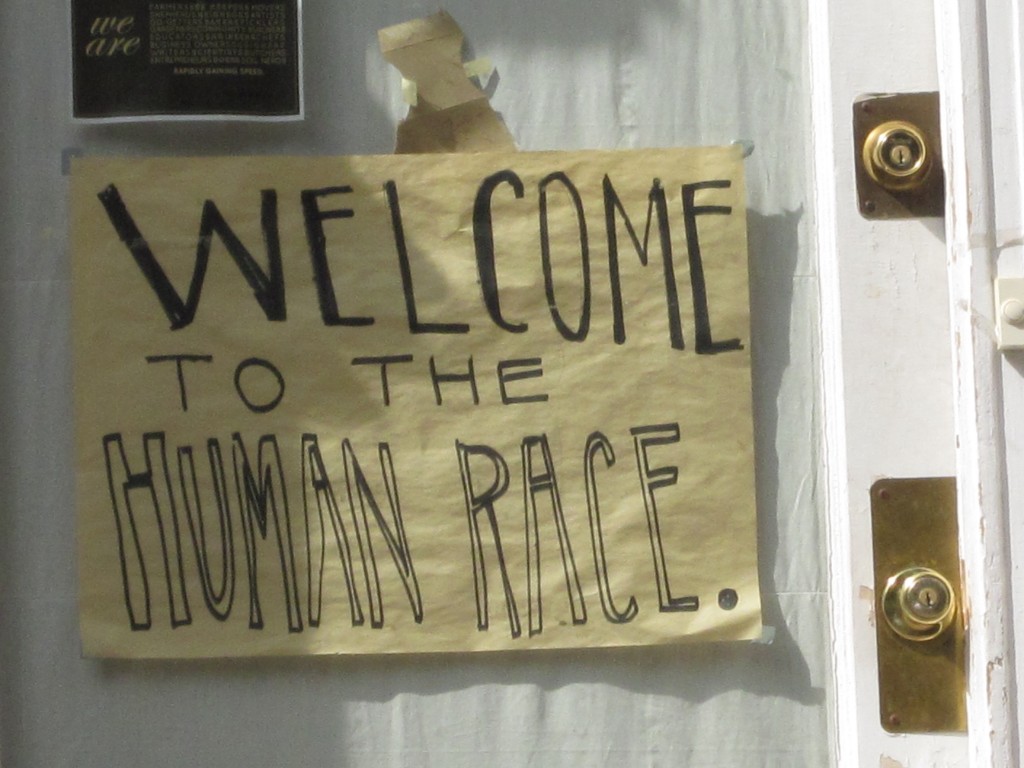 “America is wonderful during the week, but painful on Shabbat.” This is what my friend Malika wrote me after her first Shabbat back in America. I am a Shabbat nut. I love everything about it, the slowness, the meals, the niggunim. I love remembering my grandmother and finding my people and feeling part of something beyond me, above me, something huge that might carry my entire week to come towards peace.
“America is wonderful during the week, but painful on Shabbat.” This is what my friend Malika wrote me after her first Shabbat back in America. I am a Shabbat nut. I love everything about it, the slowness, the meals, the niggunim. I love remembering my grandmother and finding my people and feeling part of something beyond me, above me, something huge that might carry my entire week to come towards peace.
But Shabbat, this version of intense, gung ho Shabbat is harder to come by in the secular world. At yeshiva in Jerusalem I was the odd one, the resister, the girl who in America was always finding a way to light candles, and in Israel was always desperate to break a biblical law. Over time my resistance subsided and I submitted, full throttle, to the systems that bind. I went to synagogue, I cooked Kosher, I turned off my computer, I walked everywhere, made a dish for the first, second, and sometimes third meal. I did Havdalah when I could, knew the portion of the week, sang loud Jewish songs into the night.
They were horrible, all of those rules, until they became romantic. Obligation, when unable to submit, was torture. And when I submit to the order of Modern Orthodoxy, the obligation became a sweet pleasure. There was a city cloaked in silence, a collective thrust towards peace, a sense of community that drove itself through every obscure Jewish corner. They said jump, so I jumped. And it was that simple. I was a good girl if I followed. But when resisting or unable to adhere I was met with internal and external conflict. There was a psychiatric twist to everything, moments upon moments upon moments where I felt like a sinner when I could not adhere to Jewish law. But the moments I didn’t “sin,” were priceless.
Back in America Shabbat is a whole different story. I long for that system, the checks and balances that a community of observers creates. I miss cleaning on Fridays and shopping for fresh Challah and groceries at the Shuk. I miss potluck dinners with close observant friends and I miss ecstatic prayer and long night walks in carless streets. It was not the law that got me going, as much as a community following the law, friendship and collective an incentive to piety. (more…)
- No Comments
July 22, 2011 by Merissa Nathan Gerson
Jewish in Israel and America
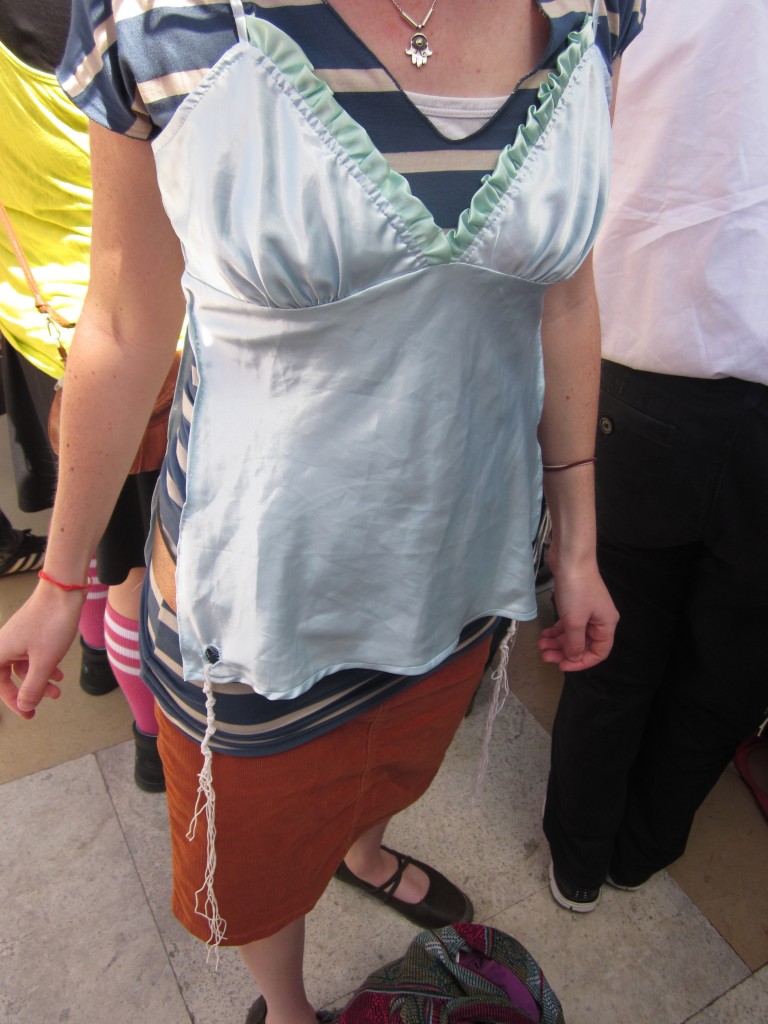 The difference between being Jewish in Israel and Jewish in America hinges on the perceiver. In Israel I was either the least or the most Jewish. Either I knew too many prayers, or too few. I was either the secular or the Orthodox, and once in a blue moon, rarely, I was simply Jewish, simply in synch, simply me.
The difference between being Jewish in Israel and Jewish in America hinges on the perceiver. In Israel I was either the least or the most Jewish. Either I knew too many prayers, or too few. I was either the secular or the Orthodox, and once in a blue moon, rarely, I was simply Jewish, simply in synch, simply me.
In America, Jewish becomes a motivated act. I become an emissary. I come out of the woodworks so they will come out of the woodworks. I pray, so they will pray.
I went to a Hindu Ashram after Yeshiva to save my body. It was victim to the yeshiva ideal, a pale, thin hunchback, only the American version: weight gain and back pain. Yes, I left more knowledgeable, but no, my body did not thank me.
So, a yoga teacher training was my way of saving my back from a future of decay, and to make up for a full year on pause from a regular yoga practice. What this meant was a twenty-four hour flip of roles, of audience, of peers and compatriots. What this meant was that I had to resume my American role: spokesperson for Judaism.
At the ashram they made an exhausted point that all religions were welcome, even that all religions were “one.” This last argument left much to be desired as we chanted to Krishna before an idolatrous altar clad with a prominent photo of “Lord Jesus.” And on Fridays there was no acknowledgment of the Jewish Sabbath unless someone initiated it. This left me assuming my role as vocal Jewess, and provoked a deep murmur from within wondering why I ever left the Jewish homeland. (more…)
- No Comments
June 27, 2011 by Merissa Nathan Gerson
Ashram
 On a break from a Hindu Ashram in the Catskills I stopped into Wal-Mart. Yes, Wal-Mart in the mountains of New York happens to, in addition to an odd myriad of all types of strange people, house the Chasidic population on summer vacation from Brooklyn. Amidst a sea of Indian gods and goddesses, a frum woman is a bigger comfort than you could possibly imagine.
On a break from a Hindu Ashram in the Catskills I stopped into Wal-Mart. Yes, Wal-Mart in the mountains of New York happens to, in addition to an odd myriad of all types of strange people, house the Chasidic population on summer vacation from Brooklyn. Amidst a sea of Indian gods and goddesses, a frum woman is a bigger comfort than you could possibly imagine.
I eyeballed the peyas and the head coverings from afar and then got in line behind a lovely Jewess. She looked into my eyes, hers full of G-d, and she said gently, softly, “This lane is closed, I am the last customer.” My Colombian friend walked up a minute later and intending to translate into Spanish, I blurted out a quick Hebrew explanation of the situation. Then I looked at the woman, a flash of eyes again, and muttered, “I was just in Israel, things get lost in translation,” and scuffled off.
Yesterday during Yoga class we were doing upside-down Asanas and a male teacher stammered, “This pose will prevent varicose veins,” and then nervously tiptoed away. An awkward phrase, a verbal bomb dropped. He wanted me to know that hanging out upside down would keep my thighs supple, and I wanted this Jewish woman to know that I was a tribe’s member just returning from the mother ship, Jerusalem.
We drove back to the Ashram when we left the superstore. My compatriots were two women, one nineteen and Indian American, the other eighteen, fierce, and Colombian. We talked after that about what happened in the store, about my intense love for the mere sight of Chasids, and about how strange, even scary, some of the Americans in Wal-Mart really looked to me. It wasn’t that I hated them, or even thought they were ugly. It was something beyond that, something in their eyes, some mark of the unrecognizable that left me full of fear.
Meanwhile, back in Jerusalem, even the most bizarre, most horrific, most awkward human is recognizable within the small rubric that Jews, Non-Jews, Christians, devotional hippies and the secular offer. Every identity marker is measurable by the individual’s relationship to G-d, or lack thereof.
Nothing, bar the jets in the sky, the bombs at bus stations, the borders as warzones is scary, that is, nothing basic within the nation itself provokes any fear. I missed American diversity in Israel; I missed seeing multiple cultures and languages interacting in odd places like Wal-Mart. And then, at Wal-Mart, amongst people from all nations united under what looked like American poverty, I simply and purely missed Israel. (more…)
- 1 Comment
June 1, 2011 by Merissa Nathan Gerson
There are Rules
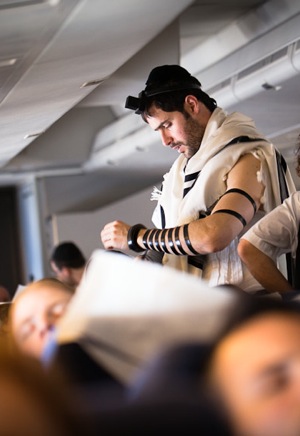
http://evantravels.blogspot.com
There are rules, somewhere, about how to be a Chasid on an airplane. In that same rulebook there are most likely also a set of behavioral norms for a woman in stretch pants lying about in the back of the plane.
My leg started swelling on a flight to Budapest. I went to the flight attendant for ice and took to the empty row in the far back of the plane where I could elevate my knee. Sitting across the aisle was a swipe of off white and black stripes. A giant man in his late thirties with gorgeous greying peyot was davening in the back of the plane. When I walked by in my thigh defining outfit there was a protective whisk of the tallis.
I decided things; like he hated that I could see him pray. He was wearing a special tallis with silver adornments along the hem at the top. He was wrapped in tfillin, his head covered by his shawl. I was a bit jealous; I wanted to pray and get dressed up in costume to do it. And in addition, I felt evil. If he had seen me, and in my female secular glory no less, was I not the interruption to his prayer and piety?
I sat across and faced the window so I wouldn’t flash my naked knee as I iced it. I had my back to my Chassid friend and suddenly felt something on my neck. He was standing now, and whipping his tallis about, mostly striking my face and neck with the fringes. I thought it was a joke. Then I thought he had special ownership issues. Then I was angry, convinced he was purposefully tracing a tallis across my head to somehow purify me.
I don’t like being in confined public spaces with orthodox Jewish men because I don’t understand the boundary. I don’t know when I need to stop and protect their piety, or when I need to stand as I am. On the sherut to the airport a young yeshiva bucher got on last. All the seats were taken and he had to make his way to the back and squeeze between two women. All I could think was how this was assur, and how he would have to go to the mikvah to purify himself.
On the plane I whispered assur under my breath at one point, an ugly effort to shame my Jewish neighbor. I spent most of the flight, especially after taking measures to turn away from the praying man, frustrated and annoyed with being shunned and being touched by his tallis, his belly, etc., as he moved about freely. I resented his sense of entitlement. I resented, most of all, how mid prayer, tfillin at the forehead, he stared down the bodies of women walking past him en route to the bathroom. (more…)
- 3 Comments
May 25, 2011 by Merissa Nathan Gerson
Ba'al Tshuva
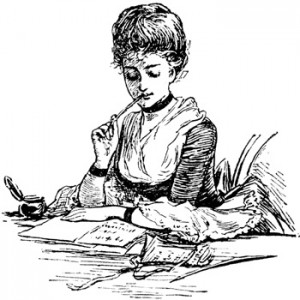 A ba’al tshuva friend suggested I read William Zinsser’s On Writing Well to help clean up my prose. I read it like bible roulette. Make a wish, close your eyes, and open to a random page. It works better with the bible because Torah is a better fortune-telling wisdom-yielder, but it still works. This week’s fortune a la Zinsser: “Get their voice and their taste into your ear – their attitude toward language. Don’t worry that by imitating them you’ll lose your own voice and your own identity.”
A ba’al tshuva friend suggested I read William Zinsser’s On Writing Well to help clean up my prose. I read it like bible roulette. Make a wish, close your eyes, and open to a random page. It works better with the bible because Torah is a better fortune-telling wisdom-yielder, but it still works. This week’s fortune a la Zinsser: “Get their voice and their taste into your ear – their attitude toward language. Don’t worry that by imitating them you’ll lose your own voice and your own identity.”
Ba’al tshuva means a person returning to the faith with fervor. It is a born-again Jew, a re-adhering human who decides to take the full religious plunge. I came to Israel a year ago, a mostly secular Jewess, with a thirst for Judaism. I attended Friday night services or Shabbat meals as a religion, and the rest, barring high holidays, fell by the wayside. In its place, I filled myself with yoga and meditation, Swami books and Hafiz poems, Khalil Gibran and others. I was a classic neo-Chasid, loving my mystical roots in Judaism and fearlessly informed by other religions.
I moved to Tel Aviv to teach English at the African Refugee Development Center. Besides teaching, everything else made me slightly miserable. This was not the Israel I remembered from living here as a kid, or visiting as a teenager. My own distaste surprised me as all I saw was a secular city aching for any opportunity to defy the confines of religion. I didn’t know a lot about Israel yet, like how this division between secular and religious is a defining factor in the country today. I just knew that religiously and spiritually—I was disappointed.
And then I somehow was ushered to Jerusalem. It was not an expected move. It was more as if there was some big hand, like in those claw arcade machines, and I was a stuffed animal, and someone in Jerusalem was winning the game. I moved to study Torah at the Pardes Institute for Jewish Studies and as my friend, Faith, explains, “You thought you were so open, but you were not as open as you thought.”
I was a post-denominational anti-establishment mystically leaning Jew enrolled in a strict text study program. I cried for nearly an entire month. For nearly half a year I took my tears to imply that I had defied gravity and was in the wrong place at the wrong time, like I had sold my soul. About nine months after my arrival I remembered what my rabbi, Rabbi Miles Krassen, then of Boulder, Colorado, once had said.
He told me a story of a woman whose steady flow of tears was a sign of her heart breaking back open, wide, and the tears were the trail back inside. Something like that, something you only hear in Boulder and only embrace, without cynicism, while living there. I thought I needed height. I thought I needed spirit and connection on a higher and ethereal plane and instead I was rooted and grounded and held by the warmest Jewish community.
Sure, it took time. I hated benching, I hated all the songs, I hated the blech and the halachic shaming. I still detest gender separate prayer, and abhorred the obligation and narrowness of everything. But it was that precise narrow obligatory Jewy core that restored a brokenness inside of me. I was cupped by a community of people whose beliefs did not echo my own, but whose devotion to being good people, G-d-fearing people and Jewish leaders was in step with my desires. We were an errant bunch, culturally mismatched despite being Jewish Americans, and yet linked by our separate relationships to the same core.
I didn’t know what a tractate was last year. I didn’t know how to read a Mishnah or who Ephron was and why buying property is complicated. I didn’t know that if you touch one edge of one sentence of Torah, it opens to a panoply of other complex sentences, perspectives, the voices of countless men, one after the other. I didn’t know how male dominated Torah scholarship had been, and how much it has evolved in recent years.
In a search for spiritual flight, I traded, without asking, for spiritual roots. I learned Jewish history this year, and modern Jewish thought. I learned about multiple modes of Jewish meditation practices, Jewish sex laws, and the inner writings of the Aish Kodesh. I spent sometimes more than nine hours a day learning, including evaluations of Tanach, of Chassidism, of Women and their obligations, or lack thereof, when it comes to mitzvot.
I was, in this process, terrified of losing my identity. I was worried about imitation, about Hebrew scholarship, about what would happen if I submitted to the rubric of religion. Somewhere in the middle something loosened in me. It was after I had to get over my arrogance, after I was humbled by low-Hebrew skills and minimal knowledge. Religious scholarship is a field in and of itself, and if I was the most Jewish of my secular friends in America, I became the least Jewish of a group of rabbis and educators and Jewish
leaders-to-be for a whole year. As they say, “It is better to be the tail of the lion than the head of the wolves.”
And so I let my attachment to ego go. Buddhism whittled its way in and I surrendered to Judaism. I koshered my kitchen. I began attending daily Mincha services. I stopped using my phone on Shabbos, and later my computer. I washed before I ate, kept laws like not cooking after sundown and waiting for three stars to appear to begin my week. I even did that old strange ritual where you jump towards the moon with an open hand, and watched bonfires sizzle en masse in Gan Sacher.
I imitated for a whole year and my fears of losing myself were never confirmed. As William Zinsser wrote, “Don’t worry that by imitating them you’ll lose your own identity. Soon enough you will shed those skins and become who you are supposed to become.” My identity returned, in full throttle. “My” Jewish, my way in Judaism is paved clear as day ahead of me. I am losing my devotional practice as my departure and return to America loom. I am disengaging my submission in order to survive in the secular world all over again. I am not scared, though. If I can leave myself for devotion, than I can also leave devotion for myself. Somehow, I am almost certain, devotion will return, and return, and return again.
- 6 Comments
May 16, 2011 by Merissa Nathan Gerson
I Was In Love With A Medicine Worker
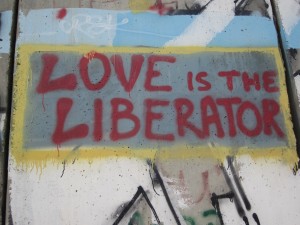 I was in love with a medicine worker. We sat in the mountains at an outdoor café towards the end of my four-month trip to South Africa. We were sealed at that point, two hearts attempting to find a way to gracefully detach. During our meal a station wagon drove up and my mentor got out. I excused myself from my lover and took to my mentor, hugging and greeting him with great joy. This man had coached me in how to ingest South Africa, how to digest Apartheid, on how to determine the nutritional value therein.
I was in love with a medicine worker. We sat in the mountains at an outdoor café towards the end of my four-month trip to South Africa. We were sealed at that point, two hearts attempting to find a way to gracefully detach. During our meal a station wagon drove up and my mentor got out. I excused myself from my lover and took to my mentor, hugging and greeting him with great joy. This man had coached me in how to ingest South Africa, how to digest Apartheid, on how to determine the nutritional value therein.
I was an activist studying in Cape Town. The more I learned of multiculturalism and social change, as was the goal of my time there, the more my head split and my heart opened and my previous activism platforms felt hollow. This mentor sat with me on the fenced-in porch of a township community center as I cried, “How do you keep going?” The whole weekend we learned about keeping hope alive despite Cape Town’s secret underbelly, the unmarked graves, a city “drenched and built on blood.”
We visited the sites of massacre and of rebellion, a tour of history off the books. And we ended up behind a barbed wire fence for a Rosh Hashanah gathering, challahs hand-braided in Langa, song and prayer with a diverse group including former revolutionaries largely responsible, depending on whom you asked, for the fall of Apartheid. So when months later I saw this man who, despite his own wounds, like hating the one blonde girl in our group because “her eyes reminded him of his former jail guard,” I was overwhelmed and excited.
Everyone in Cape Town holds a story, and more than one story contradicts. I hugged my mentor goodbye and watched him get back into the car, the backseat of a Volvo, cap pulled down covering his eyes, as his wife drove him away. To me, an American thirsty to learn and know any history beyond my own, thirsty to rub up against the most prickly of South African history, to me, my mentor was a hero.
I walked back to my friend and he looked at me as if he had seen a ghost. “Why are you talking to that man?” He asked. “Do you know who that is?” (more…)
- 3 Comments
May 4, 2011 by Merissa Nathan Gerson
Becoming a Man in my Family
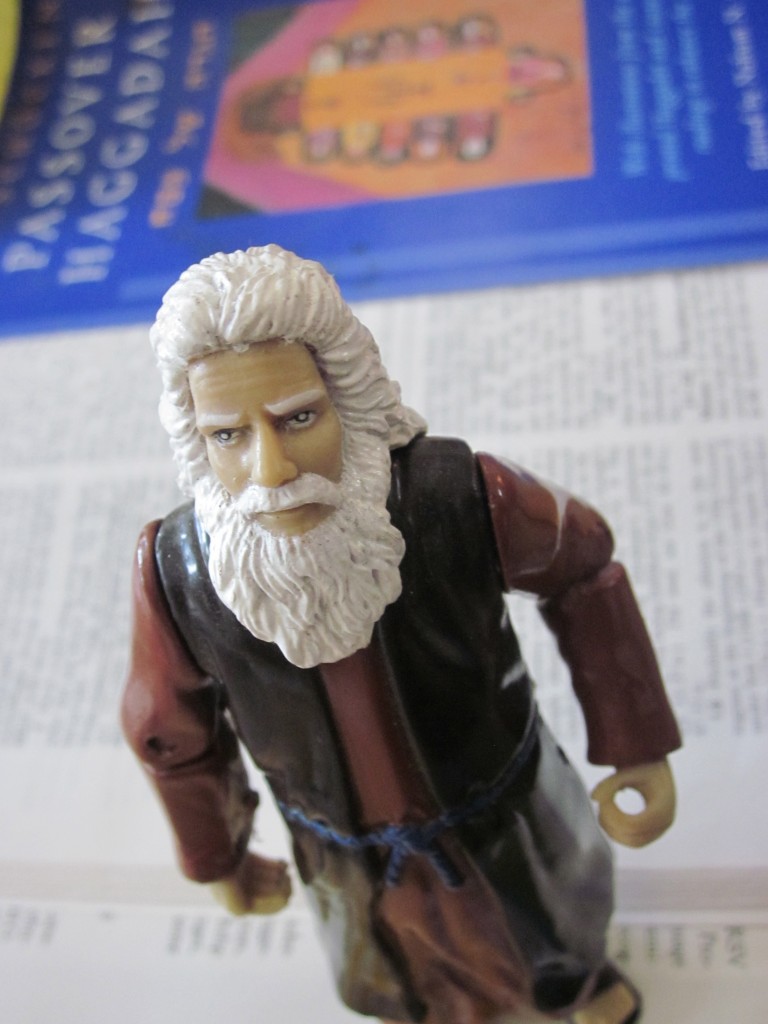 In a hot tub in California I met my cousin Ruthie for the first time. I had known her my entire life, but never like I did in our bathing suits, in the steam, family ditched poolside. We were there for our cousin Mara’s Bat Mitzvah, the whole family, gathered exiles from New Jersey, Florida, Connecticut, Washington, DC, Italy, Argentina and California.
In a hot tub in California I met my cousin Ruthie for the first time. I had known her my entire life, but never like I did in our bathing suits, in the steam, family ditched poolside. We were there for our cousin Mara’s Bat Mitzvah, the whole family, gathered exiles from New Jersey, Florida, Connecticut, Washington, DC, Italy, Argentina and California.
Family time, back in the day, was always the same. There were the men–and then there was everyone else. As I got older, particularly when I became a Women’s Studies major, the Gerson boys’ club became the bane of my Jewish existence.
Why? Because within my home growing up in Washington, DC, my voice was honored as equal to my father’s. At Shabbat dinners my father would invite political powerhouses, writers and rabbis to the table and I was not only given permission, but pushed and encouraged to represent my own views in well-articulated arguments. I was asked to tell about Job and his struggles with G-d, or my views on Arabs and Israelis or social ethics or international politics. I was encouraged to see myself as one of the boys, as a man really.
Except at larger family gatherings.
This was when the old country came in. From Poland to New York, all those tough male cousins who got in street fights and needed my father, the biggest of all of them, to intervene. No matter how evolved or covertly feminist my immediate family had become, in my Jewish post-Polish extended family I became a mere “girl,” and an invisible wall formed. I remember one cousin addressing my brother, both of them Columbia alums. My brother got stories on how to put wine on the heater to get drunk off of alcohol air, or even was asked to engage on topics of religious morality. If I tried to enter the conversation, it was clear it would require something of a third ear. Akin to using auditory blinders, a filter was activated to blot out the female voice when more than one male engaged in conversation. (more…)
- 2 Comments
 Please wait...
Please wait...